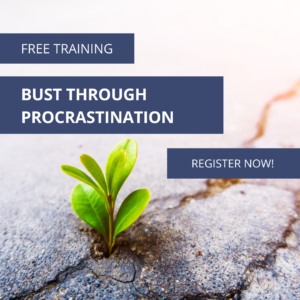Free time. Maybe you use it to go hiking, or to catch up with “The Crown.” Maybe you use it to have long pancake breakfasts with your family, or to read your favorite mystery novels. Or maybe you’re so wiped from work that you use it to stare blankly at a wall while listening to a podcast.
Free time is yours to use however you want.
That’s the beauty of it! It’s time that you can use to be as active or as restful as your mind and body craves.
I know you love your free time, however you choose to use it. I also know that if you’re like a lot of my clients, your free time is the first thing to go when you’re struggling with time management and productivity issues.
Does this sound familiar? When Friday night rolls around and you still have a to-do list full of urgent action items, you’re more likely to sacrifice some of your weekend time than fall further behind at work. Of course, you can’t drop your weekend responsibilities either.
So, you spend the days running errands, cleaning the house and going to kids’ games, while fitting work into every spare minute. By Sunday night, you’ve gotten things done, but you’ve had little to no down time. You haven’t taken time to unplug and recharge. You probably haven’t done many things that feed your spirit and bring you joy.
While a lot of professionals and entrepreneurs chronically struggle to create free time (and enjoy that free time without guilt), I know that a lot of people also got to experience the opposite end of the spectrum early on in the pandemic. Living in lockdown, people who were normally on the move all day suddenly had almost nowhere to go and nothing to do. Full days could be spent watching movies or scrolling through the Internet, but that gets boring for people with active minds. As it turns out, there’s absolutely such a thing as too much free time.
There’s a “right” amount of free time—and getting enough depends on time management.
What amount of free time each day would help you operate at your best? How many hours of unstructured time away from work and other responsibilities do you need each day to feel fulfilled and energized?
According to the authors of a new paper recently published in the Journal of Personality and Social Psychology, having too little or too much free time is linked to diminished well-being.
The study’s authors looked at how free time and well-being are linked using a few different methodologies. One thing they did was analyze data from nearly 22,000 Americans who participated in the American Time Use Survey (ATUS) between 2012 and 2013. (This survey is done by the Bureau of Labor Statistics each year and measures the amount of time that people use on various activities.) ATUS respondents were asked to describe in detail how they had spent the previous 24 hour-period, and were also asked to rate their own well-being.
The Results?
The study authors went through those surveys and calculated how much of that 24-hour period respondents had used for “discretionary time” (aka free time). In analyzing those results and the respondents’ self-reported well-being scores, the authors found that people who reported having had just 30 minutes of discretionary time had some of the lowest well-being scores of the entire response pool. These scores were slightly higher among people who reported having had 1-1.5 hours of discretionary time.
Well-being scores were highest for people who had two hours of discretionary time. It started dropping for people with more than five hours of discretionary time. In other words, between two and five hours of free time each day is the sweet spot for well-being.
So what does all this tell us? It reinforces something you might already know.
Using your time management tools to carve out enough free time each day is an important part of self-care and your overall life satisfaction.
Here’s a time management exercise that will help you get clear about the role of free time in your life.
- Write out everything you did over the last 24 hours, down to 15-minute increments. (Or, if you can’t remember much detail or the last 24 hours haven’t been a typical representation of your normal life, start right now and keep a log of everything you do over the next 24 hours.)
- Go through the log and circle any period of time that was truly free time. Log where you were unplugged from work and in control of your own time and doing things you enjoyed.
- Add up the total amount of free time you had during that 24-hour period. Think about that number in relation to what kind of day you had. Were you frustrated, stressed and overwhelmed? I’m guessing you also didn’t have much free time to decompress during that period.
Getting enough free time doesn’t just happen.
There will always be more emails to answer and more tasks to get done. Just like all the other important things in your life, setting aside enough time requires you to create weekly plans and time management routines that work. You need to be as intentional about scheduling time off as you are about scheduling time on.
I’m here to help you with the tools you need to develop peaceful productivity.
Join Jumpstart Your Productivity Home Study to immediately figure out where you’re wasting time and make changes to get more done—including carving out more free time.
If you’ve struggled to create routines that actually work for your life, this is the program for you. You’ll get five weeks of trainings with video recordings and handouts, plus access to 3 LIVE Q&A calls where I’ll answer any questions that you have related to the training. Click here for more information and to register!
Enjoy your free time—it’s good for you!
Sarah
- 7 Rules for Balancing Productivity and Fun This Summer - June 19, 2025
- Time is Money: Maximizing Time Management During Financial Anxiety - May 16, 2025
- Is Your Tax Personality Also Your Time Management Personality? - April 18, 2025



